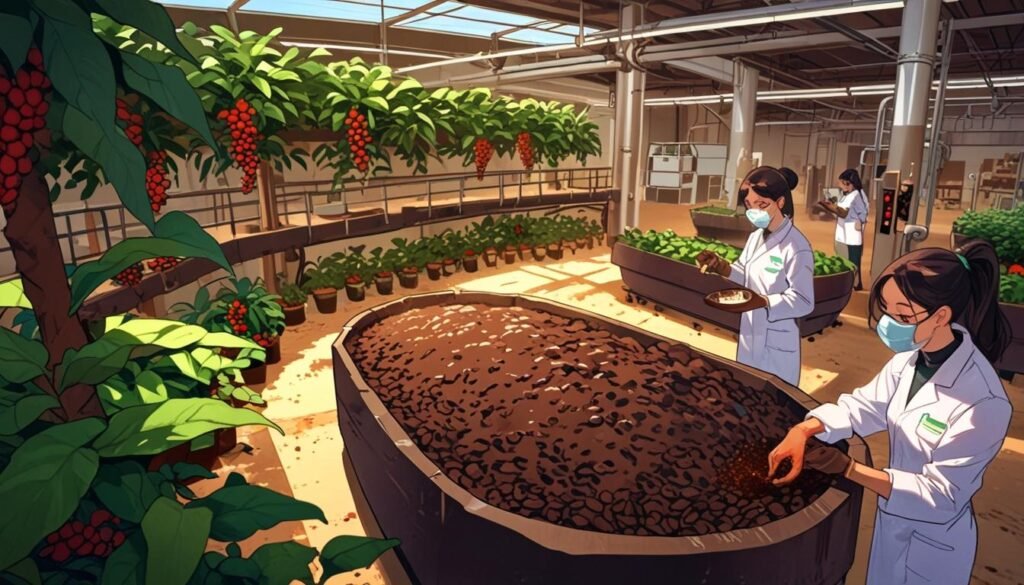**Global markets**: Climate impacts have sent coffee and cocoa prices soaring to historic highs, disrupting supply chains and prompting companies like Compound Foods to develop beanless alternatives using fermentation and food science to secure sustainable, cost-effective ingredients.
The global coffee and cocoa industries are facing unprecedented challenges as climate change impacts production and supply chains, leading to soaring prices and growing uncertainties. What were once future concerns have now materialised into immediate crises, with both commodities experiencing historic cost surges and fluctuating availability.
Cocoa prices have seen a dramatic ascent, rising from $2,500 per tonne in 2023 to over $10,000 in 2024—the highest levels in nearly half a century. Similarly, coffee prices reached a 50-year peak in 2025, with futures hitting $4.24 per pound. These spikes have been largely driven by environmental factors such as prolonged droughts in Brazil and Vietnam, which produce approximately half of the world’s coffee beans, as well as diseases like the swollen shoot virus affecting West African cocoa crops. The equatorial regions traditionally suited to growing these crops are confronting rising temperatures and erratic rainfall, making cultivation increasingly precarious.
For businesses reliant on coffee and cocoa—whether producing chocolate bars, coffee blends, or ready-to-drink beverages—the impacts are tangible and significant. Rising input costs squeeze profit margins, while supply volatility complicates forecasting and procurement strategies. Traditional risk management tools like financial hedging have become less effective, as even price spikes are accompanied by inconsistent access to raw materials.
Although long-term strategies such as breeding hardier plant varieties and shifting agricultural zones offer hope, their development and implementation timelines are lengthy. New coffee varieties, for example, can take a decade or more to be fully developed and commercially viable. Meanwhile, the availability of suitable farmland is decreasing; estimates suggest that up to half of current coffee-growing areas may become unproductive by 2050.
Amid these challenges, innovative solutions are emerging that seek to offer functional alternatives to traditional coffee and cocoa ingredients. Compound Foods, a company focused on developing beanless coffee and cocoa products, highlights the need for ingredients that are cost-effective, stable in supply, and compatible with existing manufacturing processes. The company has utilised a combination of food science techniques, fermentation, and formulation design to replicate the complex sensory experiences of coffee and cocoa without relying on the fragile crop systems.
According to Compound Foods, their approach began by analysing over 800 chemical compounds responsible for coffee’s flavour and aroma. Experimentation with precision fermentation and whole foods mimicking coffee cherries has led to formulations that provide comparable taste and aroma intensity. Collaborations with sensory scientists, baristas, and academic institutions such as Purdue University have validated their products through blind taste tests, with some participants preferring the alternative product over established specialty coffee brands like Blue Bottle and Stumptown.
The company is also advancing similar alternatives in cocoa production, expanding its ingredient platform to offer solutions that reduce dependency on vulnerable supply chains and lower carbon footprints by up to 70% compared to conventional coffee.
The current market environment, marked by escalating prices and supply inconsistencies, is fostering greater openness among brands to explore such alternatives. This is especially relevant for the broader commodity-driven sectors, which make up the majority of coffee consumption globally. While specialty coffee remains a niche but quality-focused market sector, its limited scale means that industry-wide risk mitigation increasingly depends on scalable and sustainable ingredient innovations.
Compound Foods emphasises that its solutions are not intended to replace all traditional coffee or cocoa but to serve as a supplemental resource, helping brands reduce formulation costs, protect profit margins, and secure reliable supplies amid climate disruptions. Suggested strategies include blending expensive commodities with alternative ingredients, hedging supply by diversifying sources, and partnering with food scientists to develop resilient products.
The company asserts that firms adopting these approaches and investing in ingredient diversification and supply-chain resilience will be better positioned to navigate ongoing market volatility. By fostering collaboration between innovators and industry players, it aims to help bridge the widening gap between supply and demand caused by environmental and economic pressures.
As climate challenges reshape agricultural landscapes and commodity markets, businesses reliant on coffee and cocoa are encountering a landscape fundamentally altered from previous decades. The emerging response by companies such as Compound Foods illustrates a shift toward adapting supply chains through innovation and diversification to sustain the availability and enjoyment of these culturally significant crops.
Source: Noah Wire Services

